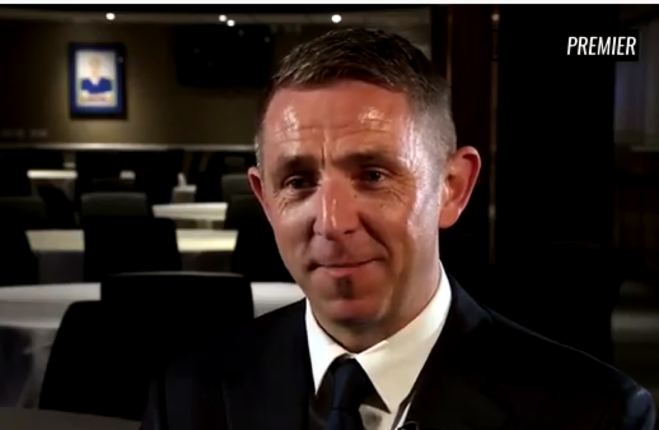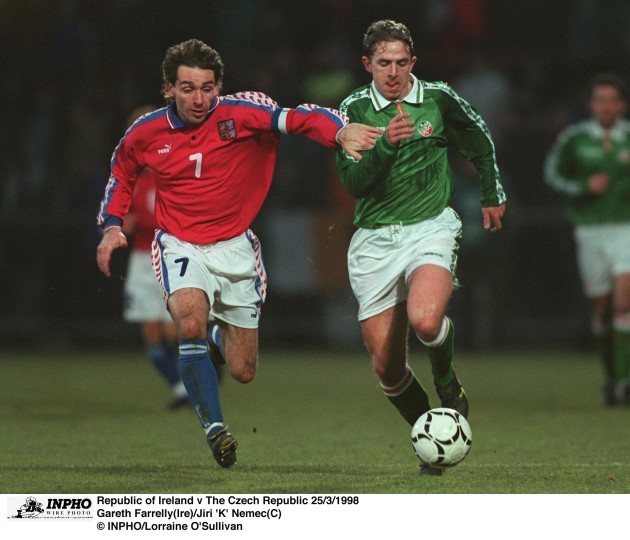IN 15 DAYS’ time, Gareth Farrelly will text the surgeon who saved his life.
Almost 12 years ago, Farrelly vomited blood and underwent surgery following a splenic artery aneurysm, a rare disorder from which 90% of sufferers die.
Farrelly, however, was the one in 10, and has sent the same message on every 30 April since 2009 to say thanks, mark how many years have passed and reflect on whether he’s making the most of life’s generous epilogue.
The answer to that last part is in his Twitter bio.
“Former International footballer. Sport & Litigation Lawyer. FA Independent Football Panel Member. UEFA MIP Alumni. CAS Arbitrator.”
Gareth Farrelly isn’t a guy who has spurned his chance for reinvention.
His day job is as a commercial litigation lawyer with Bermans, and he’s just scraping away the last of his lunch at his home in Southport when I phone him.
He jokes whether he’s working remotely or remotely working and is like the rest of us: grateful for the health of his family, stoically accepting of the situation while snatching for the words to describe this gargantuan crisis.
“It’s unprecedented…it’s surreal, isn’t it?”
Farrelly has weaned himself off the rattling news cycle, which has lately been filled with NHS workers’ pleas for more protective equipment from the government.
“I’m incredibly supportive of the NHS”, says Farrelly. “I’m still alive because of them. I have respect and empathy for them, and I struggle to see how these people – who are lifesavers all of the time – can be sent into work and into this situation without having the correct equipment. It’s devastating. I struggle to reconcile that..I get angry and upset.”
But the main purpose of our conversation is talk football across England and Europe. I want to know how the sport has been affected by the Covid crisis, and how it might look when the crisis ends.
“Nobody can forecast where this is going, that’s one of the unprecedented elements of this”, says Farrelly. “In the legal world, people want certainty, they want to know what their options are. But no matter how much thought goes into this, you cannot deal with every possible eventuality and outcome at this time.”
Farrelly is, as you’d expect, attuned to nuances and detail, as is evident when we talk about one of the main talking points in Britain over the last couple of weeks: whether or not Premier League footballers should take a pay cut.
This became a front-page issue at the start of the month, when UK Health Minister Matt Hancock said Premier League players should “take a pay cut and play their part.”
The Premier League, the clubs and the players have been in paranoid stalemate ever since. The League proposed players take a 30% wage cut or deferral, and while the players have donated money to the NHS, they have not agreed to a collective cut or deferral. Some players are distrustful of their clubs: do they really need to save on our wages, or will they use this as an opportunity to cut back to have some money to splurge on new players down the line?
Most players are now negotiating with their clubs, and Southampton last week became the first Premier League club to strike a wages deferral deal with their players.
“I thought that was wholly inappropriate, as you have a situation in which you’re looking at using football as a means of distracting and deflecting people scrutinising their job and how they are dealing with the pandemic themselves”, says Farrelly of Hancock’s comments.
Because of the interest in football that becomes a big story, and you then have people talking about the players, the clubs and the leagues without that being an evolved landscape as they are all dealing with those issues on a day-to-day basis. I don’t understand why people are having a conversation about cuts. The deferral point is something totally different. In Italy they haven’t been able to agree to deferrals or cuts; in Spain they haven’t been able to agree to deferrals or cuts.
“The UK is no different, I don’t believe it’s straightforward. And are you talking about a deferral, to help clubs through cashflow issues, and if it’s not that, why has it become about pay cuts?”
Is he surprised at the level of distrust between players and their own clubs?
“I’m not surprised by it. We’re all in this together until we’re not.”
The truth is that many clubs do need to cut back or at least delay paying wages to survive this crisis. According to Swiss Ramble, the Premier League stands to lose around £1.13 billion in revenue if the season is not completed.
The Championship paints an even uglier picture. According to a study by the Independent, of the 18 clubs to declare their accounts for the 2018/19 season, 10 had higher wage bills than total income.
Uefa recommend a club spends no more than 70% of their income on wages, and only four Championship clubs are below that figure. It’s not just those gambling for a place at the top-flight banquet that are run in such a way: Barcelona are also well above the Uefa threshold.
“People see clubs earn billions of pounds and think they can continue to operate and be immune to this situation, but it’s not the case”, says Farrelly.
“When you look at accounts in detail, they are not equipped to be able to ride this out for a sustained period of time. They are susceptible to this, and that’s irrespective of the vast sums in the game
“What we’re living through is shining a light and stress-testing a lot of these things that possibly might not have been looked at before, as not a lot of people wanted to focus on it.”
I tell him that football wasn’t built for a crisis like this.
“No, but what industry was?”
I ask whether football will emerge from this as a more conservative industry, less willing to spend the kind of sums that have been spent up to last month.
“I don’t know, as people sometimes don’t like to associate football with real life. We are having this conversation now, but in the gossip pages in tomorrow’s newspapers they will be talking about a £200 million bid for Harry Kane.
“It’s not just in football, I think there has to be a recalibration generally of how we view things and where we perceive value to be.”
So while it might be too early to know the answers, it’s not too early to ask the questions.
“That’s our challenge now”, he continues, “to challenge people to think differently. Sport is a huge means of doing good, it’s a positive, and I think people miss their sport greatly.
This isn’t a simple conversation, but if you look in football at how much more prevalent betting has become, how much more exposure there is: there are a lot of things there that are not necessarily to the betterment of the game.
“The constant pursuit of profit, revenue and more has not necessarily worked. That’s why I look at it now and see it as an opportunity to return to a more value-based, balanced system.”
What does fundamental change look like? Nobody quite knows yet, but that it happens looks increasingly necessary.
And if necessity is the mother of all reinvention, perhaps it is right to heed this necessity from one of reinvention’s sons.


